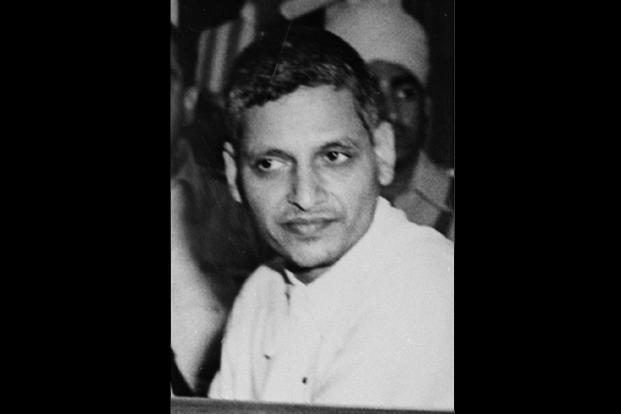WORSHIPPING GODSE, A FALSE GOD
- By : Anirban Ganguly
- Category : Articles

Instead of undertaking a deep soul-searching on why it has reduced itself to a state of profound irrelevance, the Hindu Mahasabha is displaying a terribly unhistorical spirit by feting Nathuram Godse. It should look to Veer Savarkar and SP Mookerjee for guidance
The Hindu Mahasabha — or whatever is left of it — recently celebrated the death anniversary of Nathuram Godse all over the country. It also accused the RSS and the BJP of not doing enough for what it termed as the “Hindu cause.” It is indeed deeply ironical that the Hindu Mahasabha today fetes Godse as a martyr and hero — because in his lifetime and much before he actually assassinated Mahatma Gandhi, Godse himself had vehemently rejected or disowned the Hindu Mahasabha as he had rejected and given up on Veer Savarkar.
In his deposition before the trial court, Godse clearly enunciated three rejections — he rejected the Mahasabha’s political approach and attitude; he rejected Savarkar as a leader and he also criticised and rejected Syama Prasad Mookerjee’s leadership of the Mahasabha. That Godse had, for long, disassociated himself from the RSS is also well known, but that is maliciously set aside in order to keep rolling a narrative of siege.
Godse’s rejections are well known — but it serves the nefarious interests of Congress vice president Rahul Gandhi, his mother and their communist cheerleaders to obfuscate that historical reality in order to keep their propaganda mills well oiled and in production mode. There is no dearth of closet-Goebbels and most of these or rather all of these are found in the ranks of the Congress and communist parties and among the intellectuals that inhabit and subsist off the eco-system that they have so assiduously built over decades.
One may argue that Godse’s rejections were a tactical move to exonerate and protect Savarkar and the Mahasabha from implication in the Gandhi assassination. Any scholar who has dispassionately examined Godse’s life and action will broadly agree that the man was not given to emotionalism and tactics. On being told that he had gone to seek Savarkar’s blessings and that Savarkar had told him that “Gandhiji’s 100 years were over” and that he was, therefore, bound to succeed, Godse derisively replied “I was neither so superstitious as to crave for such blessings, nor so childish as to believe in such fortune-telling.” In countering the prosecutor’s position and argument that he was an instrument in Veer Savarkar’s hands, Godse especially made it a point to argue back saying “he (prosecutor) painted me as a mere tool in the hands of Veer Savarkar. This statement I felt to be a deliberate insult to my independence of judgment and action.”
A brief examination of Godse’s rejections would be in order here before one takes forward the point that the Hindu Mahasabha, instead of undertaking a deep soul searching on why it has reduced itself to a state of profound irrelevance, is in fact displaying a terribly unhistorical spirit by worshipping Godse.
Savarkar’s prolonged illness from 1944 onwards and his near suspension of all public activities as a result of that major indisposition, argued Godse, led to the influence and activities of the Hindu Mahasabha being crippled. Godse rejected Mookerjee’s leadership at this stage, because “when Mookerjee became its (Hindu Mahasabha) President, the Mahasabha was actually reduced to the position of a hand-maid to the Congress.” Not that Godse was even then active in the Mahasabha; he had already charted his independent path of running the Hindu Sanghatan Movement. He was being selective and untruthful in his assessment of Mookerjee, when he accused him of running the party as a hand-maid of the Congress. Far from it, in fact, as soon as he took over the reins of the Mahasabha, Mookerjee began articulating, during his countrywide political outreach programmes, on the need and the role of the Mahasabha.
Mookerjee’s articulations of the Mahasabha programme demonstrated a stark sense of realism, “so long as communal considerations loom large in the field of Indian administration and sinister Anglo-Muslim conspiracy continues,” he argued, “the Hindu Mahasabha must function as an active and fearless political organisation which can both defend the rights of the Hindus and of India as a whole…The political goal of Hindu Mahasabha is complete independence of India.
It stands for joint electorates, if necessary with reservation of seats. Its asks for no special favours for Hindus in any part of the country. Its aim and policy are consistent with the welfare and advancement of India as a whole…If a time comes when religious and communal considerations disappear from the field of Indian administrations and all parties are swayed by one common national ideal, there may be no need for a separate political organisation for Hindus as such.”
Viceroy Archibald Wavell complained that the Mahasabha under Mookerjee’s control was as “anti-British as Congress” and telegraphed to the Secretary of State that Mookerjee’s paper Nationalist — carried consistently anti-British articles throughout the War period and right up to the end.
Godse’s rejection of Savarkar and through him of the Hindu Mahasabha is also interesting. The following incidents, as narrated by Godse, led him to reject both. When Gandhiji’s public meeting at ‘Bhangi Colony’ was broken up by Godse and his accomplices, Savarkar is said to have severely remonstrated and protested saying, “If Gandhiji preached anti-Hindu teachings in his prayer meeting you should hold your party meetings and condemn his teachings. Amongst ourselves all different political parties should conduct their propaganda on strictly constitutional lines.” Godse rejected such a call.
Next, Savarkar’s call to recognise the “tri-colour flag with the wheel, as a National Flag” and his act of hoisting “this new flag with the wheel, as a National Flag, on his house along with the Bhagwa”, appeared sacrilegious to Godse and he rejected it. The final point of rejection came when “Mookerjee asked his (Savarkar’s) permission through a trunk call as to whether Mookerjee should accept a portfolio in the Indian Union Ministry. Veer Savarkar emphatically replied that the new Government must be recognised as a National Government and must be supported by all patriots and consequently Hindu Sanghantanists ought to extend their cooperation by accepting a portfolio if called upon to do so.
He also congratulated the Congressite Ministers for the compromising attitude they were taking in calling on a Hindu Sabha leader like Mookerjee to participate in the forming of a National Ministry.” For Godse, such an approach was inexplicable, he “deeply resented” every one of these steps and decided “once for all to chalk and work out our active programme quite independently of the Mahasabha or its old veteran leaders. We resolved not to confide any of our new plans to any of them including Veer Savarkar.”
In fact, Godse’s act of assassinating the Mahatma announced the gradual and permanent decline of the Mahasabha in Indian politics. By rejecting Mookerjee’s advise of opening its doors to all sections of the Indian people and to eschew politics and focus instead on strengthening Hindu society culturally, it also lost out on one path that could have led to its self-renewal. Even though it managed to win four seats in the first general election in 1951-1952, the Mahasabha gradually lost all ideological direction and capacity at re-invention.
In the end, Mookerjee’s panacea for the Mahasabha continues to remain strikingly relevant, as historian Prashanto Chatterjee in his opus, Syama Prasad Mookerjee and Indian Politics, observed, “Mookerjee called upon the Mahasabha to establish close contact with the labour class and with farmers and work to ameliorate the condition of the exploited and the downtrodden. Coming to social reconstruction their first and foremost social programme must be the complete removal of untouchability followed by the two fold task of spreading the true teachings of Hindu dharma, symbolised in the Gita, and imparting physical culture, through training full time workers belonging to different provinces.”
Mookerjee also argued for the Mahasabha to have an economic programme, “comprising rural reconstruction work on a planned basis, development of suitable cottage industries correlated to improved standard of agriculture”, national industrial reconstruction, preservation and improvement of cattle stock in India through cattle breeding an cattle welfare, establishment of ‘Conciliation Boards’ in disturbed areas so as to tackle communal problems and of ‘Arbitration Boards’ to “settle numerous disputes among Hindus.” Mookerjee was also emphatic for the Mahasabha to work on empowering Hindu women —politically and socially.
Let the Hindu Mahasabha, thus, choose whether it wishes to celebrate Godse who rejected it or whether it aspires to undertake a profound self-analysis and reposition itself — if at all there is scope and space for that — based on the ideals and thoughts of Savarkar and the suggestions of Syama Prasad Mookerjee.

















